Anniversaries are special occasions, and the tenth anniversary of the David A. Garfinkel Essay Scholarship is especially precious because it was so dear to the heart of our beloved Founder, former Chief Judge Judith S. Kaye. At the end of a Board of Trustees meeting, she and trustee Barry Garfinkel fell into conversation about possible educational initiatives. They concluded that an essay scholarship for students beginning their college careers would be the ideal first project. Barry, on behalf of himself and his wife Gloria, offered to fund the prize in memory of their son. That was January 2008, and the scholarship has gone from strength to strength in the intervening years.
As we talked about the details, Chief Judge Kaye decided that Law Day would be the perfect time to present the prize — this meant that we had less than three months to launch the competition and select the winner. Educating young people about government and democracy was always very important to Judge Kaye, and because she believed that SUNY and CUNY Community Colleges filled a vital role in providing access to higher education to all, she designated the state’s community college students as the group to which the new scholarship should be awarded. Barry and Gloria Garfinkel were in total agreement about the value to society of the community college system and happily endorsed her suggestion.
As required by law, The Historical Society of the New York Courts had been formed by a charter from the New York State Board of Regents and so, from its inception, the Society was incorporated as an educational institution. When the Society launched the essay scholarship, we realized the true value of this designation — the education establishment warmly embraced our project and Cornell University, which ran an annual meeting for Community College Social Studies teachers, offered to promote the contest at an upcoming conference.
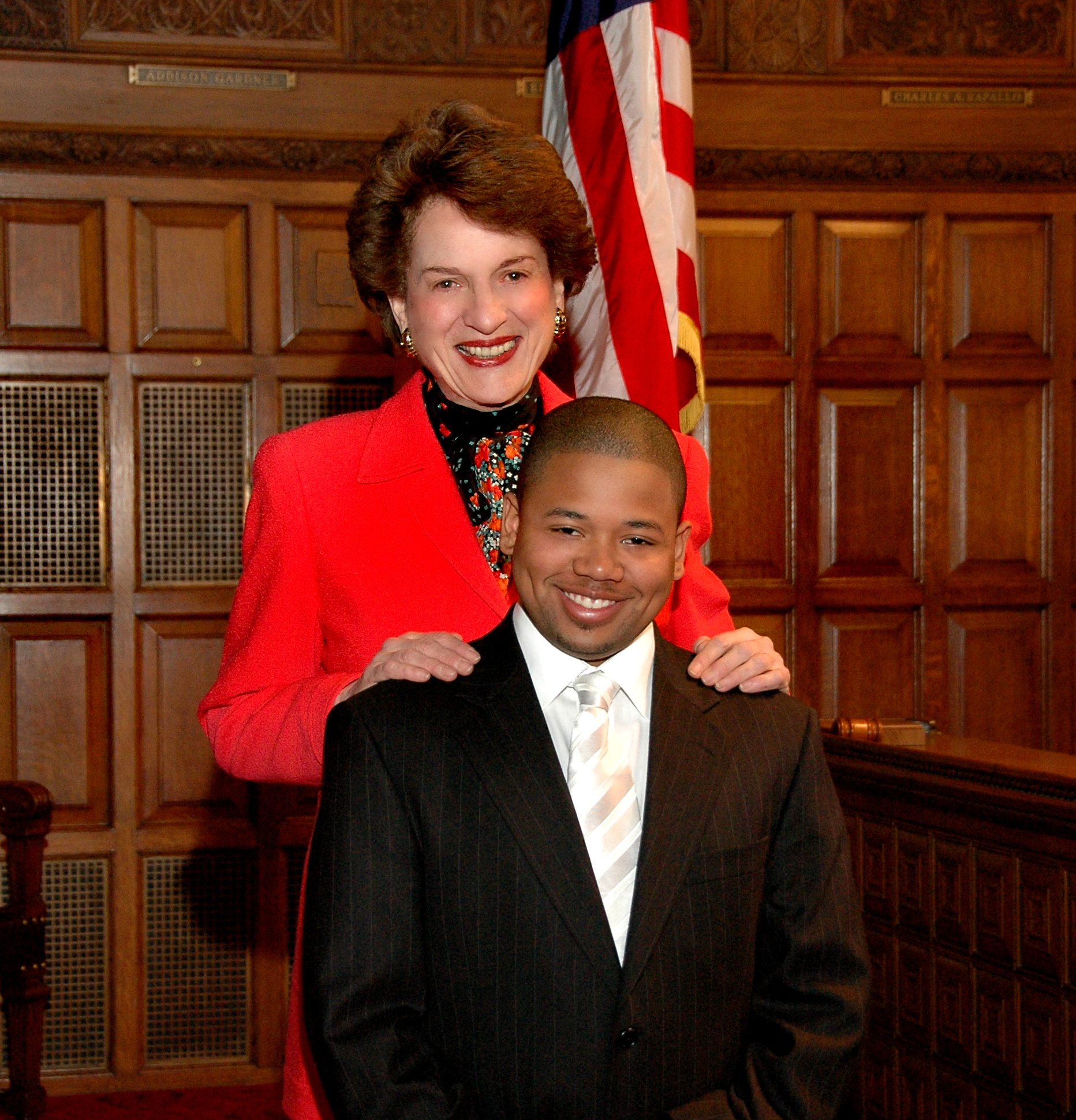
Selecting the topic for the first essay scholarship proved easy — one of our fellow trustees, John Gordan III, had recently published an account of an historically important case, the Lemmon Slave Case, in the Society’s magazine. This detailed account of how the New York court system was pivotal in freeing twelve enslaved people who had arrived in New York harbor in transit from Virginia to Texas provided a wonderful resource for the students. Our first winner was a young man from Hudson Valley Community College, Elijah Fagan-Solis. The 2008 Law Day ceremony was held outdoors on the steps of Court of Appeals Hall, and all of the Fagan-Solis family were in attendance to see their son and brother receive the prize and the congratulations of Chief Judge Kaye, Governor Eliot Spitzer, Attorney General Andrew Cuomo, New York State Bar Association President Kathryn Grant Madigan, and Gloria and Barry Garfinkel, sponsors of the competition. His mentor, Professor Kathryn Sullivan, also celebrated his success. The text of Elijah’s essay can be found here.
Following this strong start, the Society’s 2009 scholarship focused on the legal system of the Dutch colony of New Netherland, and the many legal concepts that were carried forward when British rule was established and the colony was renamed New York. Dawar Jamal, a business student at Queensborough Community College, was awarded the grand prize at the Law Day ceremony at Court of Appeals Hall in Albany.
The scholarship sponsor, Barry Garfinkel, suggested the topic for the 2010 scholarship — the legal developments that resulted from the construction of the Erie Canal. It was a great topic because of the canal’s impact on the laws of contracts, torts and eminent domain, and because it led to the emergence of the precursor of the Court of Claims and developments in the law of sovereign immunity. Leah Marie Reino of Genesee Community College was awarded the scholarship at that year’s Law Day ceremony at the Court of Appeals.
The 2011 scholarship, perhaps the Society’s most popular essay topic, marked the centenary of the Triangle Shirtwaist Factory Fire. The students’ essays described how the tragic factory fire had led to the establishment of the New York Factory Investigating Commission that, in turn, led to the enactment of significant worker protection laws in New York, and later influenced much of the New Deal legislation. Amelia Weimar of Onondaga Community College and Kevin Volk of Genesee Community College took first and second prizes, respectively. James Gerber, a firefighter and 9/11 first responder then studying at Borough of Manhattan Community College, used the New York Fire Department archives to write his prize-winning account of the actions of the fire chief at the time of the Triangle fire, and the chief’s determination to draft a fire code to ensure that a similar tragedy would not occur in the future.
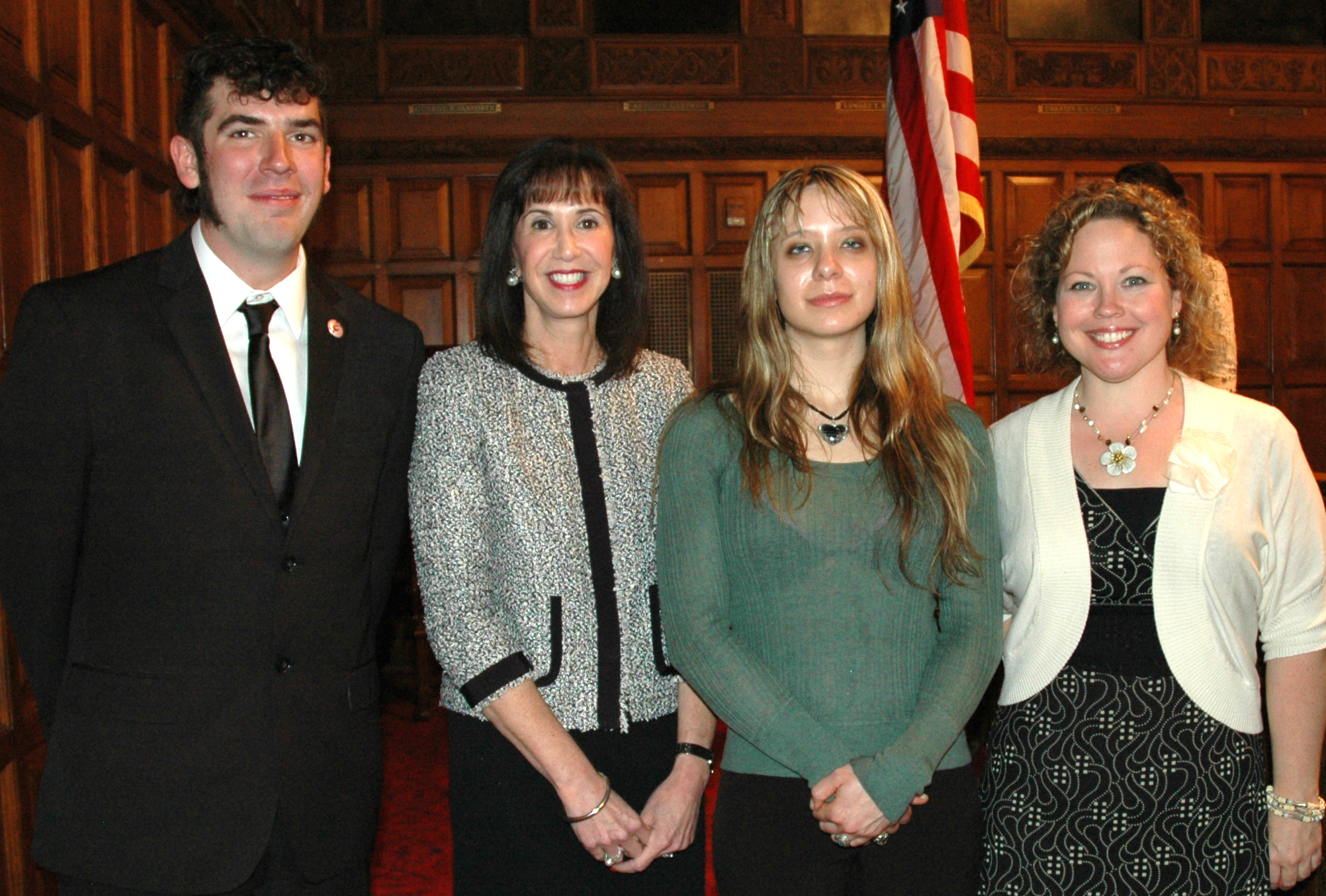
L-R: Rodney Schulyer, Hon. A. Gail Prudenti, Amanda Griffin, and Mary Erckert
When our President, Judge Albert M. Rosenblatt, discovered that former Court of Appeals Judge Francis Finch had authored the famous Civil War poem, The Blue and the Gray, the Society celebrated Judge Finch’s achievement by focusing on the legal changes that emerged during the Civil War as the topic for the 2012 essay scholarship. The subject resonated with the students, and the Society received many thoughtful and reflective essays that year. Rodney Schuyler of Fulton-Montgomery Community College won first prize for his essay entitled Slave-Contraband-Soldier-Citizen; Mary Erckert of Erie Community College was awarded second prize for her essay dedicated to The Honorable Soldiers Detained in Camp Chemung, Elmira, New York; and Amanda Griffin of Genesee Community took third prize with her essay, Wages of Silence: The Dangers of Wartime Suppression of Rights.
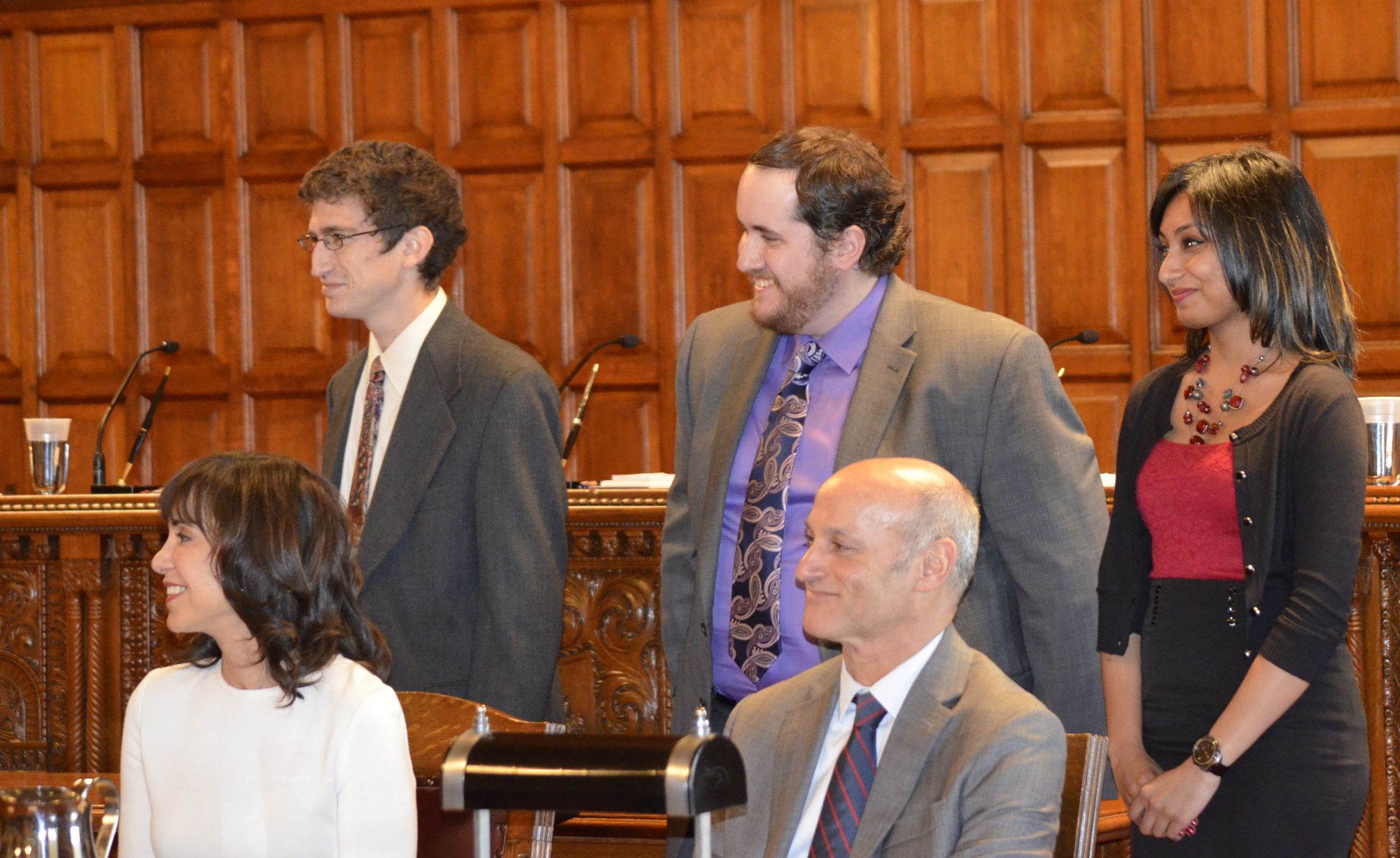
Top Row, L-R: Zachary Field, Josh Pawlikowski, and Ruby Singh
Moving away from historical subjects, the Society chose Cyberspace and the Law as the topic of the 2013 Garfinkel Essay Scholarship. On Law Day of that year, Josh Pawlikowski of Mohawk Valley Community College won first prize for his essay entitled A Slow Eclipse: The Fourth Amendment in the Age of Counter-Terrorism. Ruby Singh of Queensborough Community College took second prize for her essay Personal Privacy vs. Digital Lives, and third prize was awarded to Zachary Field of Onondaga Community College for his essay Reason and Privacy: Applying the Fourth Amendment in the Digital Age.
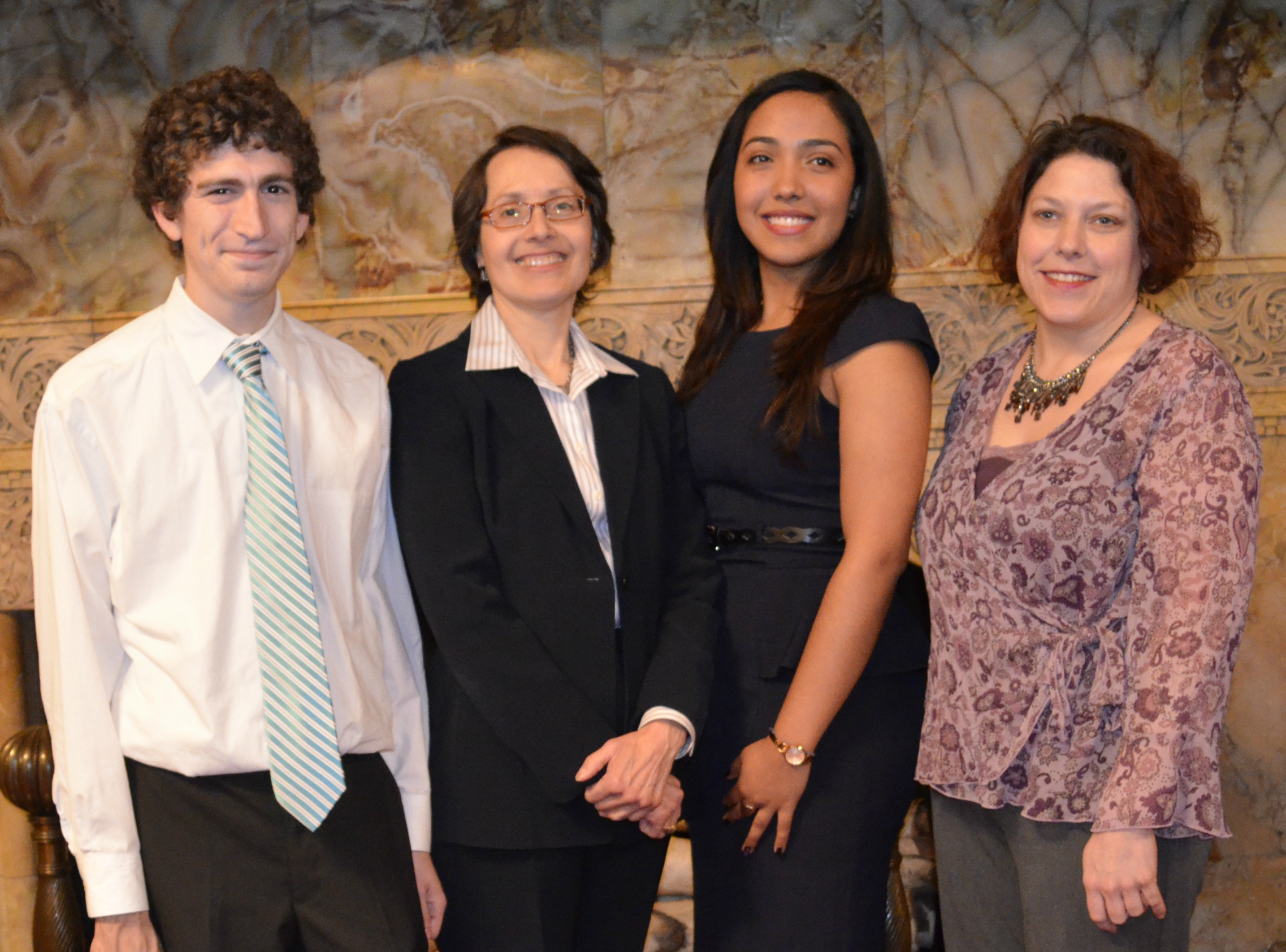
L-R: Zackary Field, Judge Jenny Rivera, Lida Ramos Arce, and Rhonda Parker
In 2014, the scholarship focused on Free Speech and a Free Press in the Electronic Age. The Honorable Jenny Rivera had been appointed an Associate Judge of the Court of Appeals and she, a former CUNY law school professor, enthusiastically supported the Society’s outreach. She gave a presentation at Queensborough Community College encouraging students in their academic careers and extoling the value of the good writing skills that the Essay Scholarship encouraged. Zachery Field of Onondaga took first prize with his essay Balancing National Security and Freedom of the Press; Lida Ramos Arce of Queensborough Community was awarded the CUNY prize for her essay Who Watches the Watchers; and Rhonda Parker of Genesee Community College won the SUNY prize for her essay entitled Safe and Without Sound. Judge Rivera presented the prizes at the Court of Appeals Law Day ceremony, and afterward joined the students, their parents, their mentors and college administrators at a luncheon hosted by The Historical Society of the New York Courts.
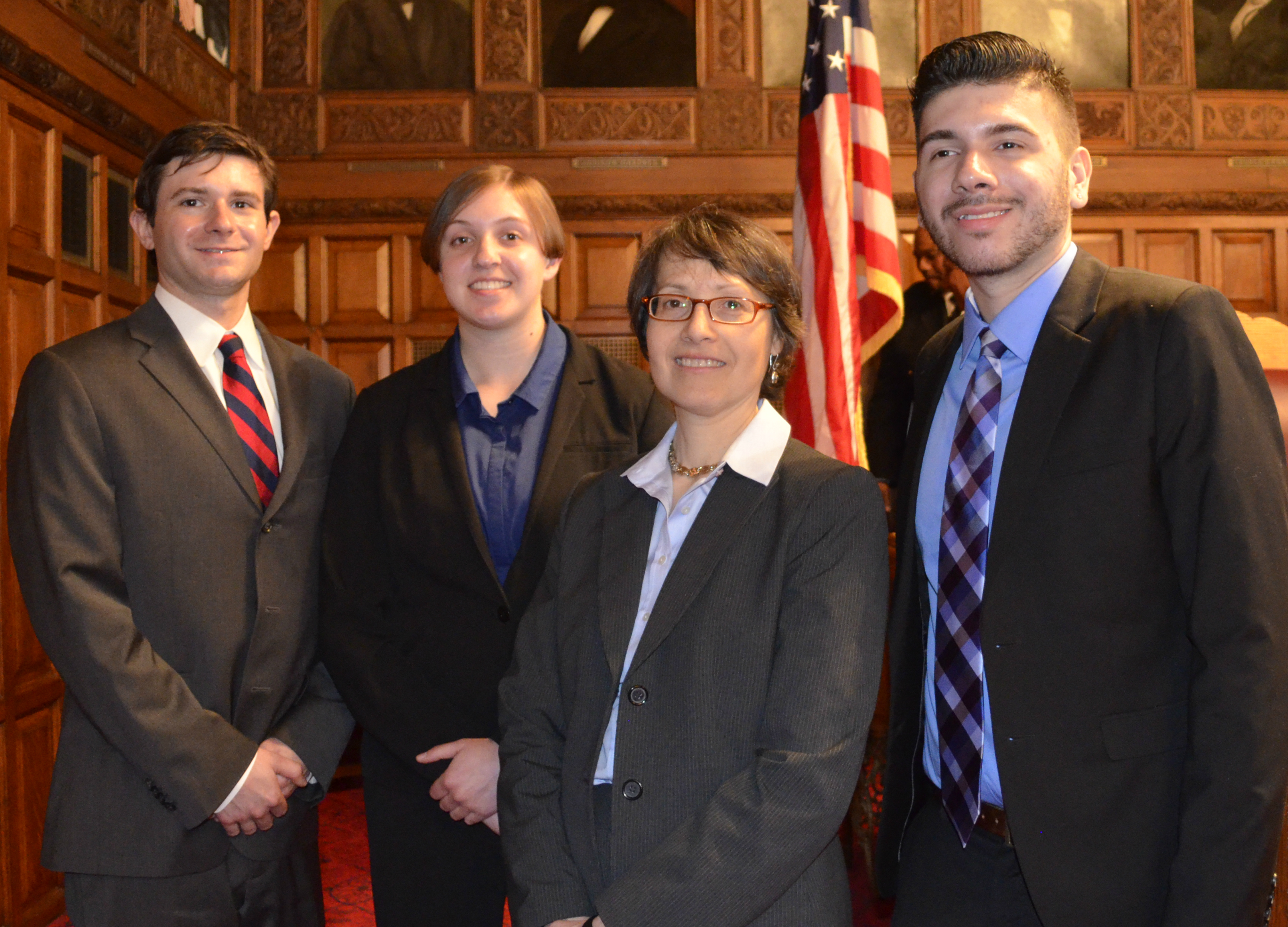
L-R: Evan Eckfeld, Jessica Cherry, Judge Jenny Rivera, and Joshua Cruz
The Society returned to an historical theme in 2015, focusing on how the New York courts addressed the issue of equal human rights for the LGBT community. Again, Judge Rivera gave of her time and expertise, and spoke about education and the value of entering the scholarship competition to an enthralled audience of Community College students. During the Law Day ceremony, Judge Rivera presented prizes to Jessica Cherry of Genesee Community College for her essay entitled A Look at How NYS Legislation Has Profoundly Impacted LGBT Family Law; Joshua Cruz of Queensborough Community College for his essay The Empire State and LGBT Criminal Law: Leading the Way to Progress under Lady Liberty’s Rainbow; and Evan Eckfield of Westchester Community College for his essay Left to the States: Protecting Transgender People from Employment Discrimination.
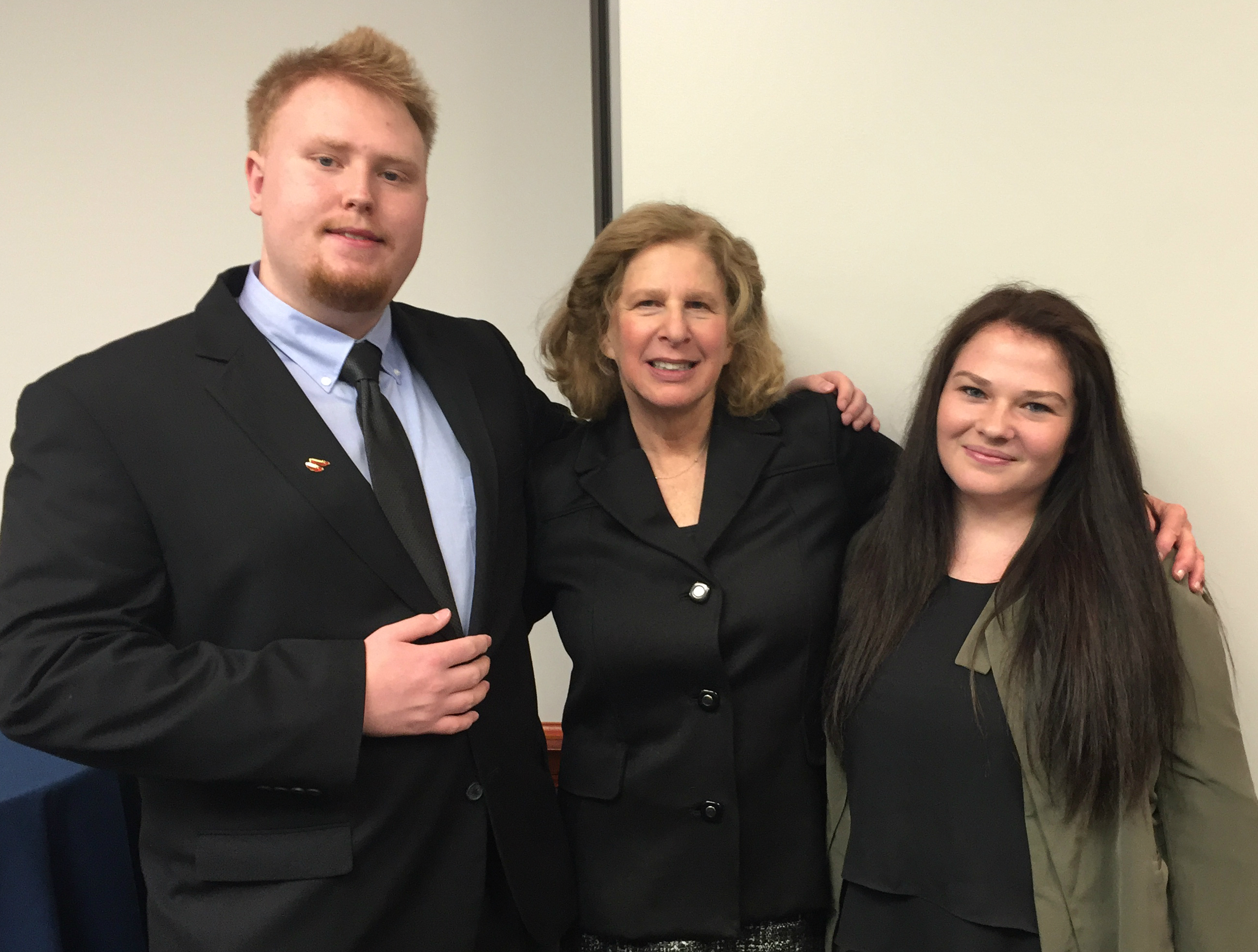
L-R: Daniel Savitz, Society Executive Director Marilyn Marcus, and Jessica Martin
In 2016, Barry and Gloria Garfinkel generously increased the funding for the essay scholarship, allowing the Society to award three prizes to SUNY Community College students and a further three prizes to students of the CUNY Community College system. The theme chosen for this year’s Scholarship was the role that jury service plays in our democracy. The three CUNY scholarship winners all attended Queensborough Community College: Daniel Savitz — How Fair is our Jury System?; Wai Shan NG — The Jury; and Mavis Duncan-Dyer — Why is Jury Service Important to Our Democracy? Does it Promote Civic Participation? The three SUNY winners were Jessica Martin of Genesee Community College for her essay The Constitutional Road to Equality by Jury; Jessica Wickham of Onondaga Community College for her essay You the Juror: What Role Does Jury Service Play in our Democracy?; and Ashlee Dow, Genesee Community College for her essay You the Juror: What Role Does Jury Service Play in our Democracy?
The title of the 2017 scholarship, the 10th installment of the contest, is You, the Voter: How Far Have We Come and Is the Journey Over? The resources provided by the Society (videos, games and articles) encourage the students to consider the history of voting rights in New York and the United States, barriers to voting in the United States, and the issue of Election District Boundaries. If you or someone you know is associated with a SUNY or CUNY Community College, please take a look or pass along information about the 2017 scholarship http://bit.ly/garfinkel-essay.
The 10th anniversary of the David A. Garfinkel Essay Scholarship is an opportune time to thank all those who have been involved: The Clerk of the New York Court of Appeals and his staff for the myriad of ways they have supported and facilitated the Essay Scholarship; the attorneys and law clerks of the Court of Appeals who volunteered to judge the essays in the early years of the competition, and the Young Lawyers Committee of The Historical Society of the New York Courts, which now performs this function; the Unified Court System Office of Public Affairs, which facilitated the incorporation of the prize-giving into the Court of Appeals Law Day ceremonies, and the other Office of Court Administration staff who have been so helpful.
The Judges of the Court of Appeals have made the award ceremonies a very special occasion for the students — all have met personally with the prizewinners, parents, mentors and college administrators to offer congratulations and encouragement. Many of the Judges have also reached out to their local Community Colleges and visited classes to provide information about the scholarship, including Judge Eugene Piggott, Judge Richard Wesley, Justice Edward Spain and, of course, Judge Jenny Rivera. Thank you, one and all.
Finally, a tribute of gratitude to former Chief Judge Judith S. Kaye and Gloria and Barry Garfinkel without whom there would be no Essay Scholarship. This year’s topic was chosen at a 2015 meeting with Judge Kaye, Judge Rivera and Barry Garfinkel, and is dedicated to the women of New York who fought so courageously for the right to vote and the men of New York who voted in 1917 to adopt the constitutional amendment that changed the voter qualification laws to include women.

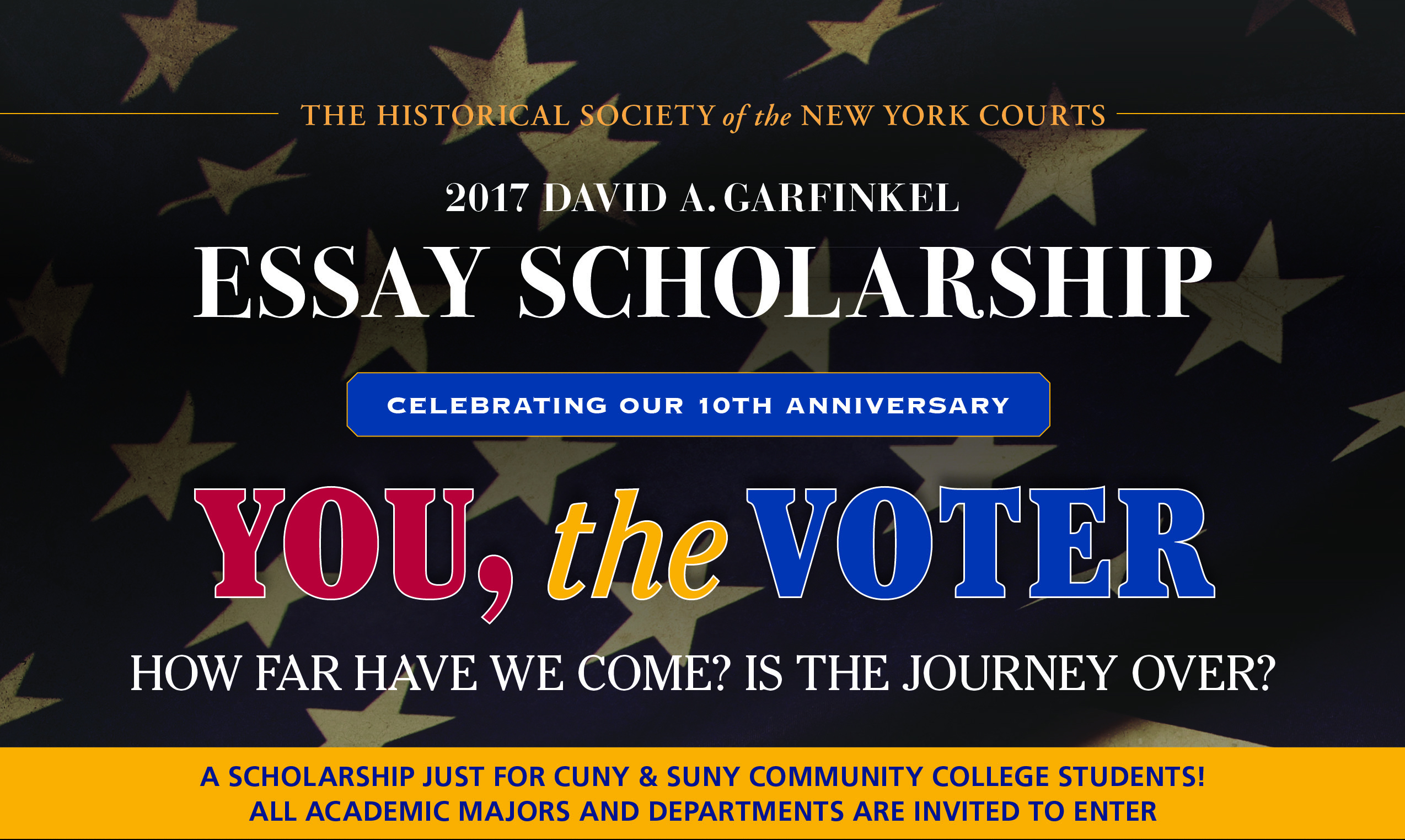
Comments · 2
Comments are closed.